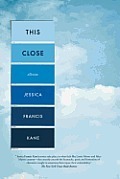This Close
 This Close by Jessica Francis Kane
This Close by Jessica Francis Kane
The quick and dirty way of figuring whether or not this book is for you is simple: Are you the kind of person that can live with being a bit of an asshole? Are you the kind of person that can stay with a conversation in which someone gently points out the little motions you go through each day that might make you one, even if she does so gently, in a way that almost forgives at the same time it condemns? If not (and that’s totally cool – I spent years hating those people that politely pulled me aside to tell me I had some broccoli in my teeth, so I know where you’re coming from), please don’t read this book. On the other hand, if you’re just someone who’s trying their best, fucking up every now and then or daily and still getting up the next morning, trying it all again, or hell, if you’re a vision of perfection who’s sure there’s nothing a piece of fiction could say that would make you feel a centimeter smaller: Read this book. Soon.
Jessica Francis Kane has an amazing detector for societies little conundrums. Circumstances other authors might skim over, or fail to notice, Kane turns into entire stories. Example: the first piece in the collection, “Lucky Boy.” It’s 15 pages about this guy that uses a dry cleaner feeling like an asshole for using a dry cleaner. Not in a mopey way, and he doesn’t even stop going to the same place after getting to know the girls working there, yet in a way that points out how crazy it is that some people have so much cash they can get others to wash their clothes while other people are so working-class they only have money they’ve earned by washing other people’s clothes. Confusing? That’s the world as Kane sees it.
That story goes on, getting more complex and even harder to judge. Instead of simply using the cleaners, picking up fresh clothes and leaving til his suits are dirty again, main man Henry starts taking the cleaners son to the park. He starts teaching the basics of how to throw and catch a ball to this apparently father-less boy. Yet, part of him still wants to just go to the cleaners and not feel guilty if the kid never learns to play ball. The other part thinks he’s an asshole for thinking those things.
Her forgiveness is amazing, though. She’s not pointing fingers, telling us how to live or ating like she know the recipe for perfection; she’s simply saying there’s no way you’ll get there. You only get this close.
It’s not just a 1%, wealth and working class issue, either. Her stories cover a world of topics: Is it better to keep your firstborn little girl in a bubble, shield her from the world, or take the risk of letting her touch the CVS floor? Better to tell the mother of a lost friend just how much he meant, or grieve on your own, not go to her for some comfort/closure? Better to stay home and take care of your aging father and resent it the whole time, or live your own life and visit at Christmas? The sucky part is, there’s not often a third option you can go with that lets everyone win and you be the hero.
On the whole, I loved the collection, even if one or two of the stories didn’t strike me to the point of sympathy. Like “The Stand-In,” in which character Hannah (Kane often builds on the same characters, story by story, in different years of their lives, which totally works and I absolutely love in this case) and her father are on a trip to Jerusalem sans Hannah’s mother/his wife. Seeing how happy her father is with a lady named Rosa, Hannah gives her father the permission basically to go for it. To be fair, I just summed up the plot of the 20-page story in that last sentence (and her father does not go for it), but even in those pages, Kane didn’t quite get me to the point where I agreed with a girl rooting for her dad to cheat on her mom.
That’s probably the worst example in the book of where Kane lost me. A couple stories felt filler, like she stuck another in there to make the page count bigger, or at least, they didn’t hit me like they should have. But when they did, it was glorious. Word-wise: this is a book that’s more interested in sinking you into the story than getting you lost in beautiful language and heart-stopping phrases. Here’s the two sentences I’m gonna leave you with, probably my favorite writing in the book, probably the ones that best summarize the entire work, said about Maryanne the copyeditor: “She liked the chance to revise and perfect. It didn’t feel like real life at all.”





